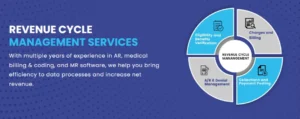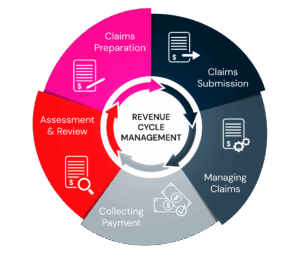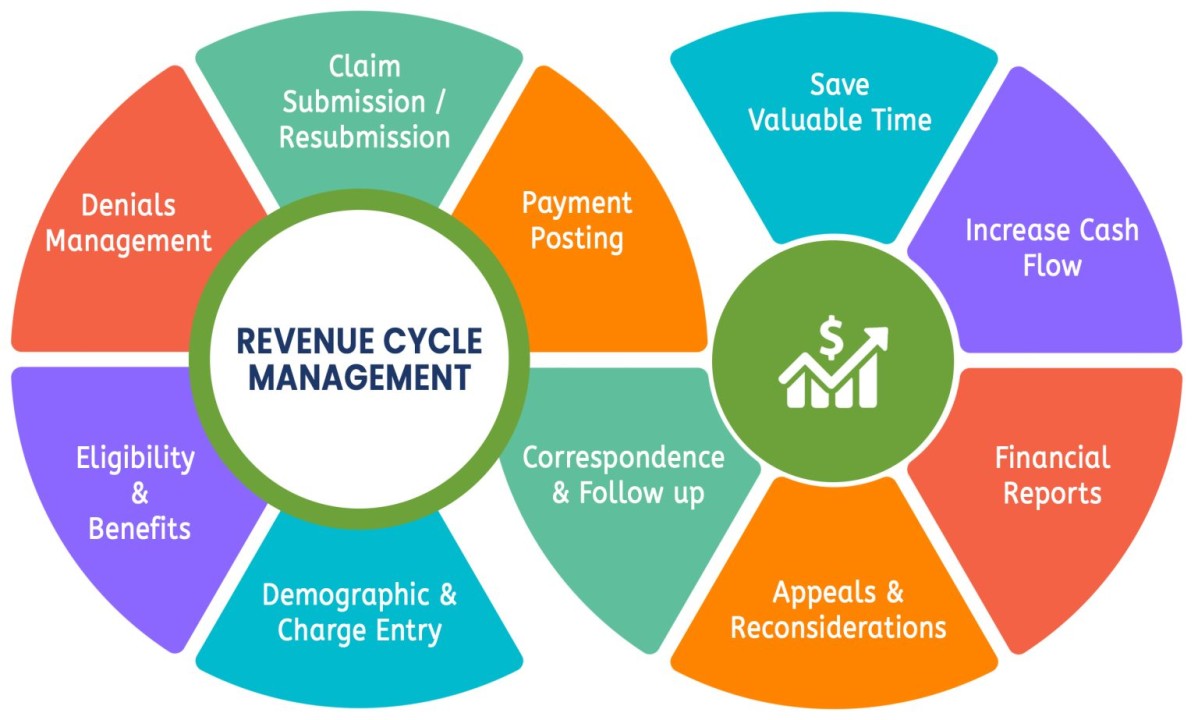Efficient resource management is as crucial as patient care in today’s healthcare landscape. Healthcare financial performance hinges on effective revenue cycle management (RCM), which includes a range of functions related to patient registration and insurance verification through claims submission, payment collections, and data reporting. When implemented correctly, RCM substantially boosts the overall productivity and profitability of healthcare organizations.
Here, we pro

vide an exhaustive glance at the top 10 advantages of revenue cycle management in medical billing.
Cash Flow and Revenue Enhancement
Another one of the many great benefits of pre-accredited revenue cycle management is improved cash flow. By streamlining the claims process and minimizing delays in payment, RCM helps to guarantee that health care professionals are paid on time. Practices can have peace of mind knowing that money rolls in month after month, so they can stay in business and focus on growth without worrying about their financials.
Reduced Administrative Burden
It also streamlines tedious processes like tracking claims, posting payments, and verifying eligibility with RCM. This decreases the administrative burden on healthcare workers and provides more time for patient care. Beyond this, by removing duplication of processes, RCM also plays a significant part in creating a more efficient and effective workflow.
Reduction of Errors and Claim Denials
Rejections and denials are among the most frequent reasons that payments are delayed or lost. RCM solutions have pre-built validations for coding validity, documentation completeness, payer-specific rules, and more. They work to resolve issues prior to claim submission in order to promote higher claim acceptance rates and timely reimbursement.
Increased Billing and Coding Efficiency
Accurate coding is essential to medical billing. Mistakes here can lead to a denial of a claim, a possible audit, or a fine. RCM workflows have evolved to guarantee compliance in coding by adding regulations-based updates. This reduces the risk of errors and enables practices to stay accurate and compliant.
Efficient Operations and Cost Savings
The billing function combines and normalizes the process and puts the health care provider in a position to run its operations more effectively. Automation and digital enable us to save time and reduce the amount of human work, reduce the price of the overhead, and speed up times. This, in turn, delivers cost savings and better financial outputs in the longer term.
Anticipated Compliance and Risk Reduction Requirements are Provided
The world of healthcare constantly changes with laws, payer requests, guidelines, and compliance. We keep you abreast of these changes to ensure you are staying up to date. This minimizes your liability for non-compliance, audit, and penalties. With embedded warnings and frequent patches, RCM enables worry-free billing.
Improved Patient Financial Experience
Against that backdrop, patients today demand billing transparency and convenience. RCM helps obtain clarity around insurance coverage, co-payments, and out-of-pocket costs upfront. It also enables various payment methods and reminders for timely billing. Patient satisfaction is increased with less delay in payment.
Enhanced Accounts Receivable Management
Unpaid bills can deal a heavy blow to the financial health of a medical practice. Strategies like Active follow-ups, Denial management, and quicker submission of the denied claims can be adopted to reduce RCM inefficiencies. This directly shortens the accounts receivable cycle, and overall cash collections stay healthy.
Data Analytics and Reporting
The management of your revenue cycle gives you access to critical information about billing patterns, claim status, payment patterns, and patient trends. This visibility enables healthcare providers to pinpoint areas for improvement, forecast revenue streams, and drive data-informed actions that improve both operational effectiveness and financial health.

Scalability and Adaptability
RCM systems that can grow with the size of the practice will enable practitioners to expand and make changes in response to changing payer models and regulations. Its versatility also means providers can maintain seamless business operations while the industry transforms and adapt to meet both short-term and long-term objectives.
Frequently Asked Questions (FAQs)
Q: What does revenue cycle management mean in medical billing?
A: Revenue cycle management is simply managing the financial lifecycle of your patient, from scheduling and verifying insurance to collecting payment. It nets less money on the released claims, but collects sooner and limits compliance issues.
Q: What are the benefits of RCM on medical billing efficiency?
A: RCM systems automate primary billing processes, decrease errors that come with a manual process, and make claims processing faster, therefore more efficient and cost-effective.
Q: Who can leverage RCM – can small medical practices really benefit?
A: Yes, RCM is suitable for any-sized practice. It allows smaller practices to manage their billing challenges better, optimize cash flow, and minimize administrative burdens.
Q: Is it wise to outsource RCM?
A: A large number of practices elect to partner with an RCM provider to cut back on overhead and benefit from specialized resources. Experts can handle the billing, while in-house staff could be more dedicated to patient care.
Q: What is the impact of RCM on patient satisfaction?
A: The overall patient financial experience can be improved with RCM through more transparent, easier-to-understand bills, more convenient payment options, and fewer billing mistakes.
Strong revenue cycle management in medical billing is increasingly becoming not only a requirement, but a necessity for the survival and profitability of healthcare providers. RCM translates into every measure of financial and operational success—from maintaining cash flow and compliance to satisfying patients. Embracing it not only ensures that prompt payment is received but also underpins the ability to maintain quality healthcare.









